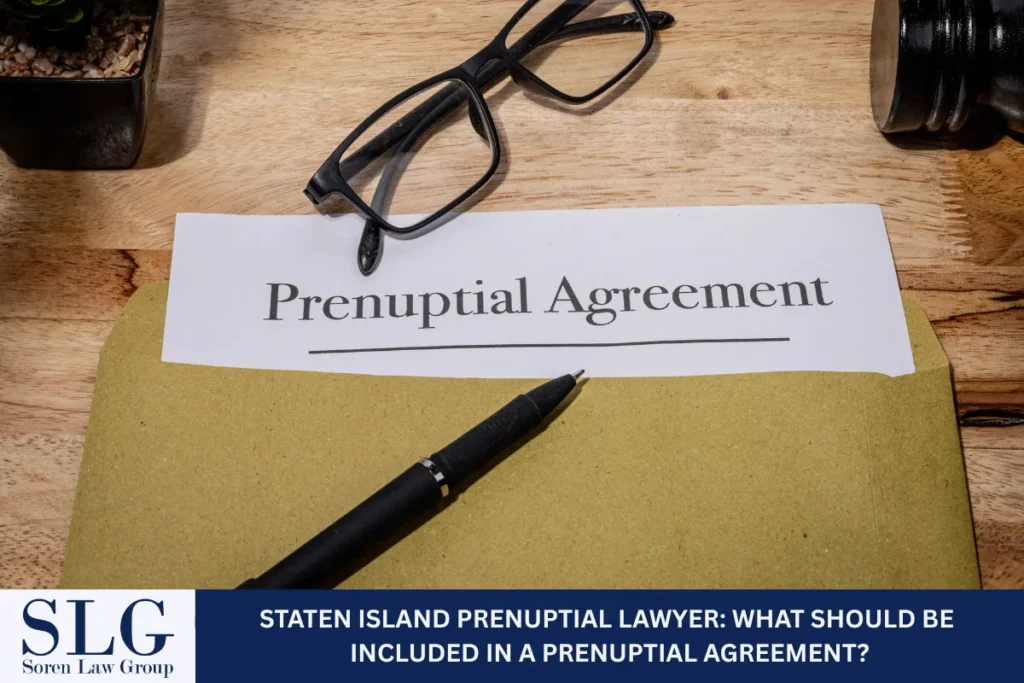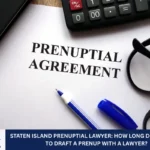If you’re planning to get married in Staten Island, New York, chances are you’ve thought about your future together, including how to protect your assets, manage your finances, and avoid messy disputes down the road. A prenuptial lawyer can help you draft a prenup—a legal agreement—which ensures that both you and your spouse are clear about property, finances, and responsibilities, should life take an unexpected turn. Many couples wait too long and end up in heated court battles or lose precious assets during divorce proceedings. Don’t let uncertainty or misunderstandings jeopardize your financial well-being or peace of mind. By thoughtfully creating a prenuptial agreement with qualified legal guidance, you can safeguard your financial future, protect important family assets, and start your marriage with trust and transparency.
The Building Blocks of New York Prenuptial Agreements
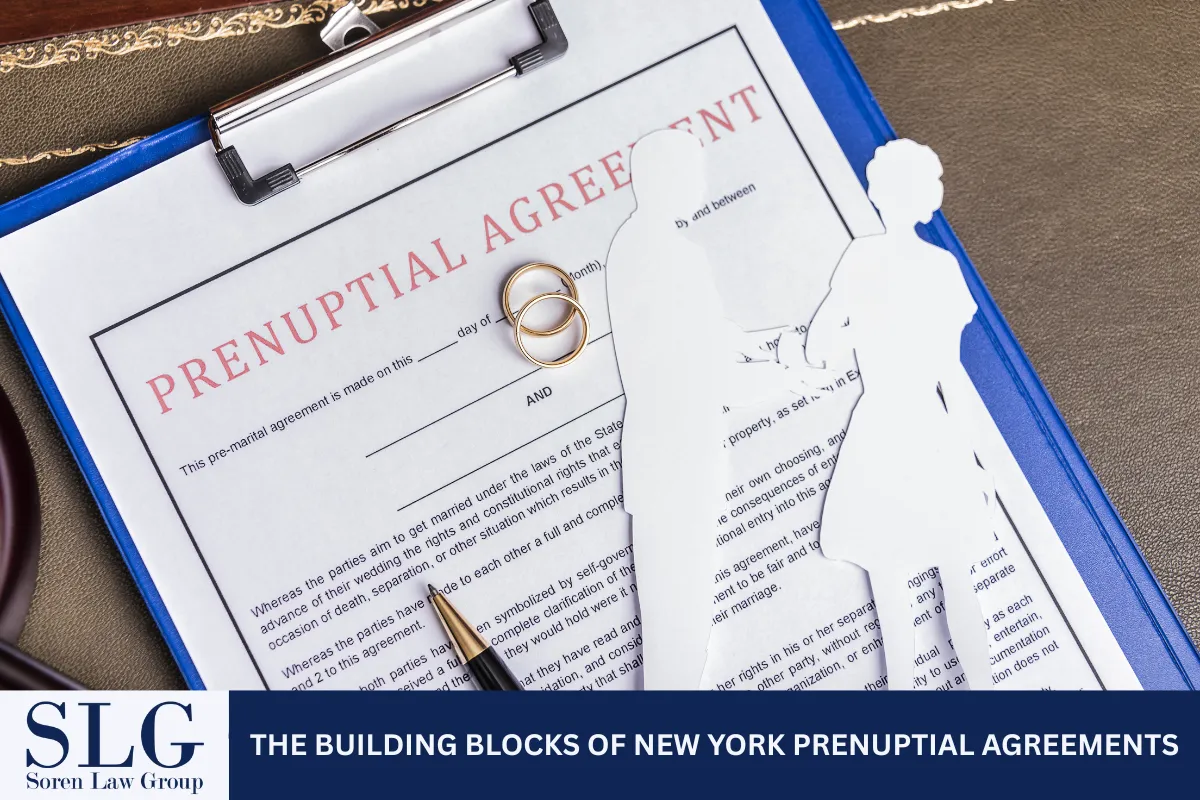
Prenuptial agreements (often called “prenups,” “premarital agreements,” or “antenuptial agreements”) are contracts signed before marriage outlining the rights, duties, and responsibilities of both people should the marriage end—by divorce or death. In Staten Island, New York, prenuptial agreements must meet state law requirements for enforceability.
When crafted with care and full financial disclosure, a prenup sets the expectations for property rights, spousal support, and asset protection. A prenuptial lawyer will explain that while you can decide many issues in a prenup, there are also important limitations—especially when it comes to anything involving children.
Prenups vs Postnups: What’s the Difference?
A prenuptial agreement is signed before you marry. A postnuptial agreement (or “postnup”) is created after you’re already married. Both can address similar issues, but postnups may face additional hurdles for enforcement.
Some couples in Staten Island and greater NYC also consider a separation agreement or even a marital settlement agreement if ending the marriage is being considered.
Key Topics Every Staten Island Prenup Should Cover

A well-drafted prenuptial agreement is not a “one-size-fits-all” document. Here’s what a thoughtful marital agreement should address, tailored to New York’s family law.
1. Full Financial Disclosure and Asset Schedules
Each party must honestly and fully disclose all assets, debts, income, and liabilities before marriage. This includes:
- Real estate (homes, rental properties, other investments)
- Bank accounts (personal and joint bank accounts)
- Retirement accounts (401(k), IRA, pensions)
- Investments, stocks, RSUs, or partnership interests
- Business ownership or family-owned business interests
- Inheritances or inheritance rights (including any Inheritance Protection Trust assets)
- Valuable personal property (cars, art, jewelry)
- Debts (student loans, credit cards, taxes)
A schedule of assets or net worth statement, attached as an exhibit, is best practice. If there’s financial wrongdoing or fraud in the disclosure process, the prenup can be challenged.
2. Distinguishing Marital Property from Separate Property
In New York divorce proceedings, property is split into two main categories:
- Marital property: Most property acquired during the marriage (income, houses, investments, etc.)
- Separate property: Assets owned before marriage, and some gifts and inheritances
A prenuptial lawyer will help you specify which property remains separate and how appreciation, commingling, and transmutation (mixing of separate and marital funds) will be handled. For instance, if one spouse owns a family business or receives an inheritance, the prenup clarifies whether these assets remain separate or become marital property.
3. Property Division and Asset Protection
A core purpose of any premarital or marital agreement is to decide how marital property and debts should be divided upon divorce or death. This involves:
- Guidelines for property distribution (who gets what)
- Carve-outs for real estate investments (like the marital residence)
- Special terms for business interests (business valuation, buy-sell rights, protection of family business operations)
- How to handle the appreciation of separate assets
The agreement can also outline how to distribute joint bank accounts and manage property rights in the event the marriage ends.
4. Allocating Debts and Financial Responsibilities
It’s not just about dividing assets; it’s also vital to define responsibility for debts, such as:
- Credit cards, student loans, and tax debts
- Mortgages or lines of credit
- How will new debts incurred during marriage be handled
Many couples include terms about how to pay for household expenses during marriage, management of joint accounts, and budgeting duties.
5. Spousal Support, Maintenance, and Alimony
In New York, spousal support is called “maintenance.” Prenups can:
- Waive maintenance rights
- Set caps or limits on spousal support obligations
- Define support duration and triggers (when, how much, and for how long support will be paid)
- Determine if there are exceptions (e.g., infidelity or if the paying spouse becomes disabled)
A prenuptial lawyer will warn that a prenup cannot leave a spouse as a “public charge” (in need of state support), per General Obligations Law §5-311. If a term is unconscionable or violates public policy, the court may override it.
6. Retirement Accounts and Estate Planning Provisions
Retirement assets such as 401(k)s, IRAs, and pensions are common in prenuptial agreements. The document should note:
- Each person’s rights to retirement accounts and pension benefits
- How benefits will be split, if at all—a Qualified Domestic Relations Order (QDRO) is often needed after divorce
- Waivers of elective share rights (so one spouse cannot claim a forced share of the other’s estate, per EPTL §5-1.1-A)
- Life insurance and beneficiary designations
- Incorporation with estate planning tools (wills, trusts, beneficiaries)
- Clarification of inheritance rights in the event of death
7. Provisions for Business and Professional Practices
If either partner has business ownership or a professional practice, a prenup should:
- Address ownership and control of the business
- Provide for business valuation at divorce or death
- Ensure business continuity and protect professional licenses or stock options
This is crucial for those seeking asset protection and smooth business succession planning.
8. Inheritance, Gifts, and Family Wealth
Prenups often clarify the treatment of future inheritances, family trusts, and gifts. You can:
- Protect someone’s rights to keep inherited property as separate
- Decide if appreciation or income from an inheritance will remain separate
- Establish inheritance rights and protection for children from prior marriages
9. Real Estate and the Marital Residence
Couples should clearly state:
- What happens to the marital home in case of separation or divorce (buyouts, sale, occupancy arrangements)
- Whether new real estate investments count as marital or separate property
Clear terms avoid conflicts over the family home and other valuable property.
10. Child Custody and Child Support
New York law says that issues regarding child custody, parenting time, visitation, and child support cannot be conclusively set or waived in a prenup. Any parenting plan outlined in the agreement is subject to the court’s review, which must act in the child’s best interests. Any attempt to “lock in” child-related matters is generally unenforceable.
That said, you can acknowledge intentions or state general wishes, but ultimate authority belongs to the courts.
Enforceability and Validity in New York Prenups
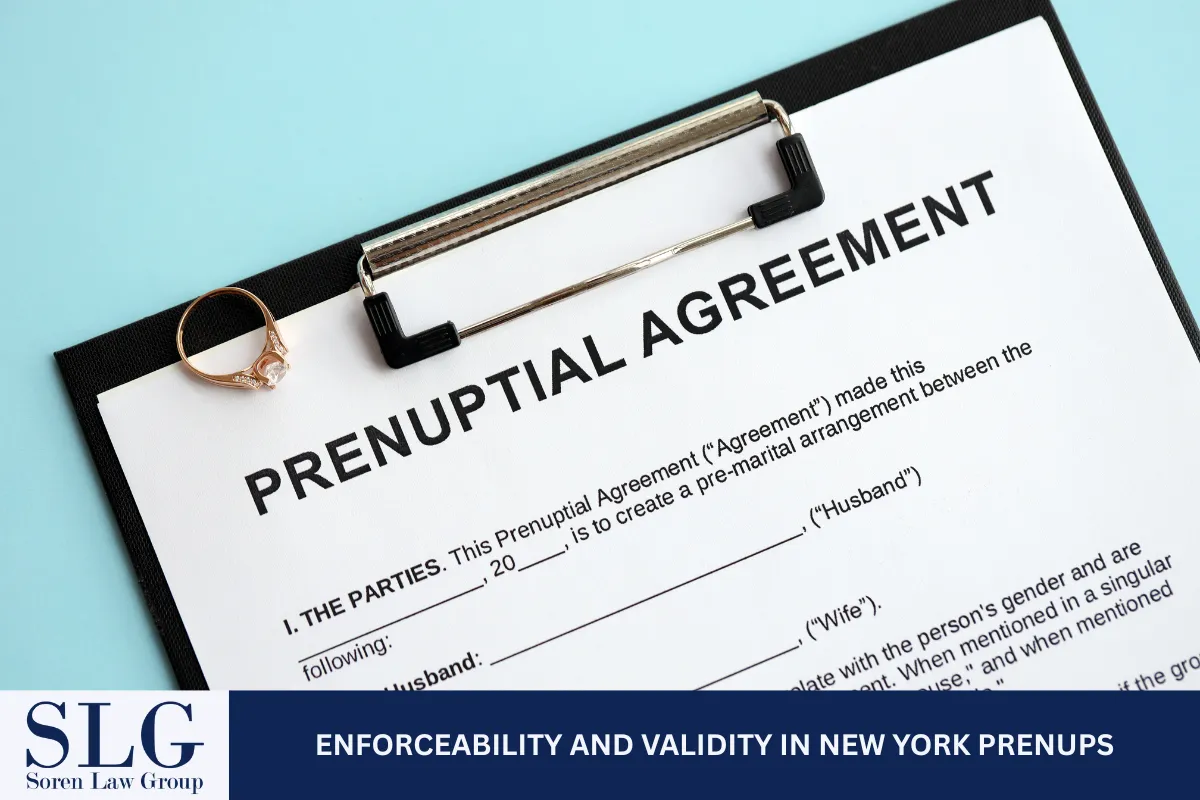
New York courts uphold prenuptial agreements if certain requirements are strictly followed. To ensure validity:
1. Voluntary and Informed Consent
Both parties must agree voluntarily, without pressure, duress, fraud, or mistake.
2. Independent Counsel and Attorney Review
It’s highly advised—and sometimes essential—for both sides to have their own attorneys review the agreement. This helps ensure full understanding of the terms, eliminates claims of unfairness or coercion, and supports enforceability. Many family law firms and divorce lawyers in Staten Island and NYC offer free consultations or case evaluations.
3. Notarization and Proper Execution
The document should be executed with notarized or properly acknowledged signatures, and clearly state that it was made in contemplation (and before) marriage. Execution timing is key—last-minute prenups raise red flags for courts.
4. Complete Financial Disclosure
The schedule of assets and liabilities must be exchanged at the time of signing. An incomplete or misleading disclosure can make the agreement invalid.
5. Fairness and Unconscionability
Terms cannot be grossly unfair or violate public policy (e.g., leaving a spouse with absolutely nothing or waiving support below minimum standards). Courts examine fairness at the time of signing and at the time of enforcement.
Key NY cases, such as Christian v. Christian and Gottlieb v. Gottlieb, hold that unconscionable agreements will not be enforced.
Updating, Modifying, and Ending a Prenup
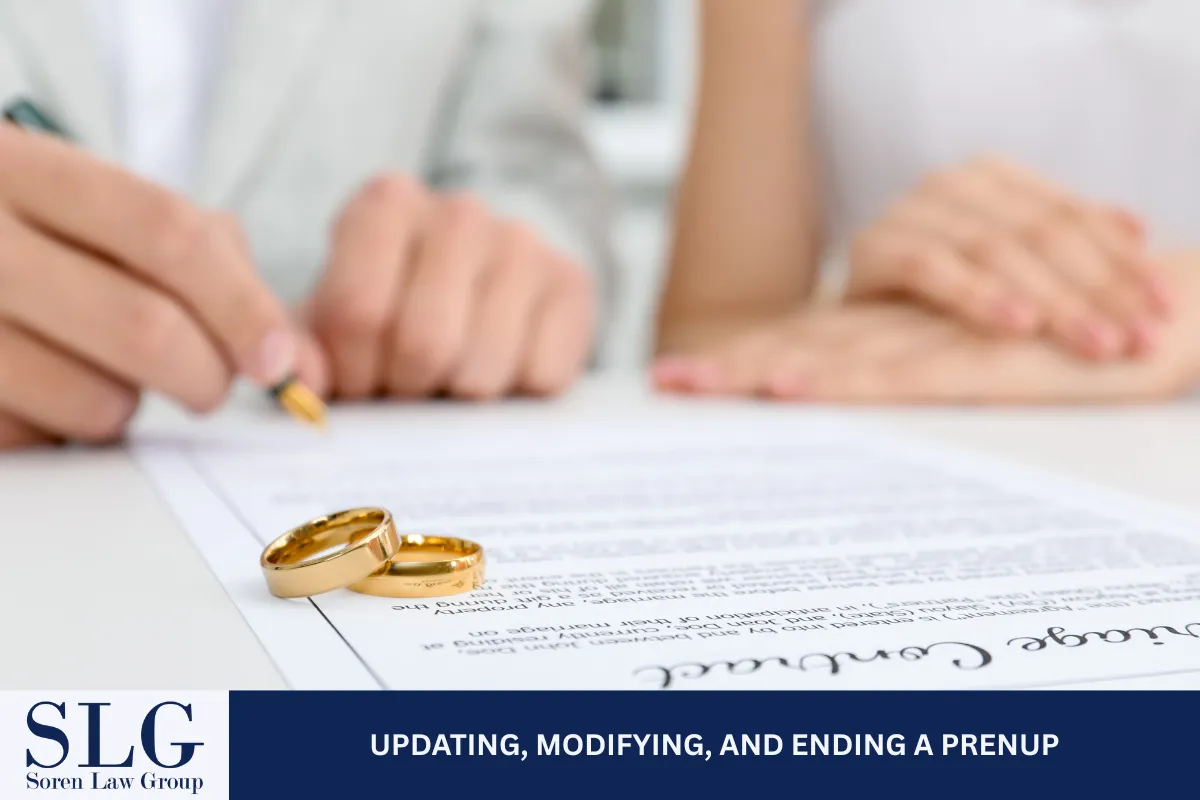
Life circumstances change. Your marital agreement should include terms for:
- Modification or amendment: How can changes be made? Do both parties need to sign, and does it need to be notarized again?
- Revocation: Under what conditions can the agreement be revoked?
- Sunset Clause: Will the prenup expire after a set period or upon a specific event (e.g., 10 years of marriage)?
Risky Clauses and What to Avoid
Courts may strike out terms that:
- Limit or pre-determine child custody or child support
- Penalize infidelity (lifestyle clauses)
- Encourage divorce or violate public policy.
- Leave either spouse without enough support.
It’s also important to include a severability clause (if part of the prenup is invalid, the rest still stands), integration/merger clause (stating the agreement is the final understanding), and clarity about governing law (specifying New York).
Mediation, Dispute Resolution, and Fee Shifting
A thoughtful prenuptial agreement will specify how future disputes are resolved:
- Mediation or collaborative law: A mediator can help resolve conflicts before things escalate to court
- Arbitration: Parties agree to a private, binding decision-making process
- Appointment of venue (e.g., Richmond County—Staten Island Supreme Court)
- Attorneys’ fees: Decide whether the “winner” is reimbursed or if parties bear their own fees
These steps can significantly reduce conflict and costs in a potential divorce.
Confidentiality, Privacy, and Non-Disparagement
Many prenups now contain clauses requiring spouses not to share private information about the marriage, finances, or family issues on social media or with the public. Non-disparagement agreements can prevent negative public remarks.
Smart Practices for Staten Island Couples
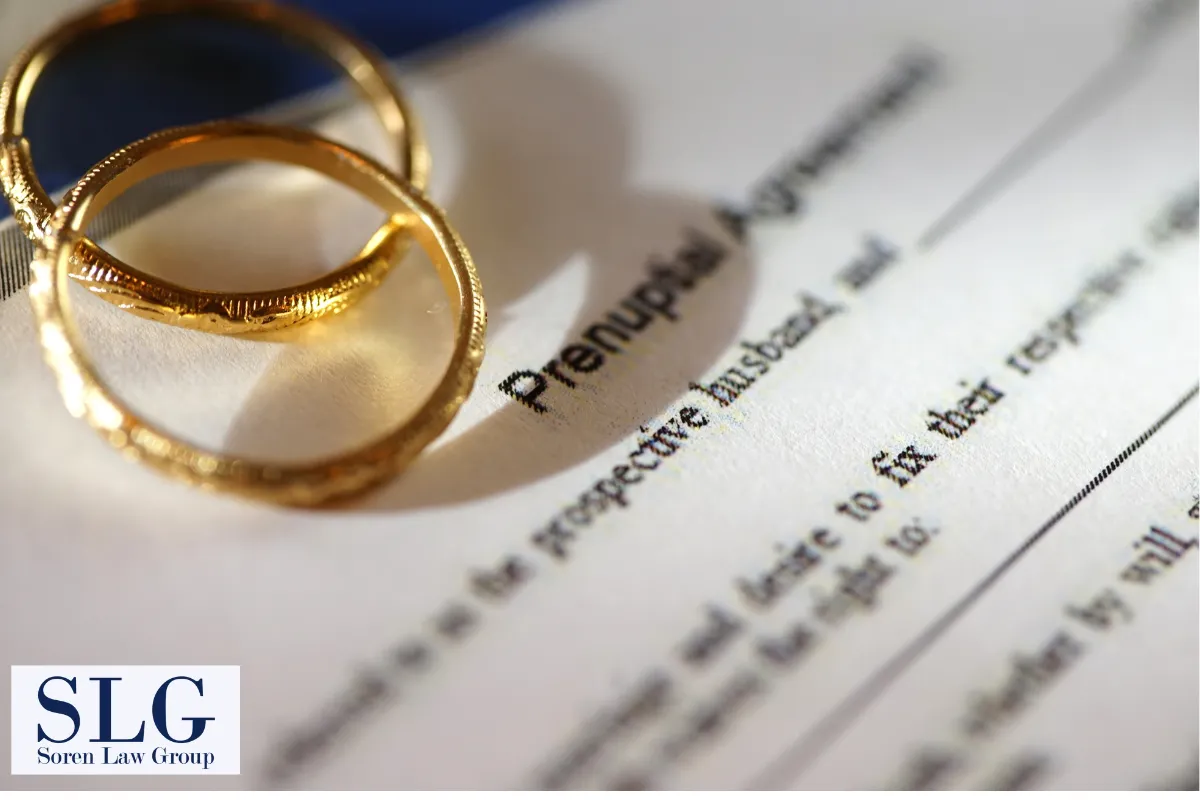
- Start Early: Begin discussions and contact a prenuptial lawyer months before the wedding to avoid last-minute stress.
- Schedule a Consultation: Choose a local Staten Island family law or divorce lawyer familiar with New York’s latest statutes.
- Prepare a Full Financial Disclosure: list all property, debts, and potential inheritances.
- Tailor the Agreement: Ensure your marital agreement is customized for your specific financial rights, priorities, and family needs.
- Include All Exhibits and Schedules: Attach schedules of assets, debts, and any supporting documents.
- Review and Update Regularly: Life changes—such as having kids, making new investments, or receiving an inheritance—should prompt you to update your agreement.
Safeguard Your Future with a Staten Island Prenuptial Lawyer
A prenuptial agreement isn’t just about protecting “stuff.” It’s a mature, empowering way to start your marriage with mutual respect, financial awareness, and a plan for every “what if.” Staten Island couples, especially in a diverse and fast-paced region like New York City, benefit from consulting a thoughtful prenuptial lawyer who can tailor the agreement to fit unique family law needs, business realities, and personal dreams—while complying with New York law.
Whether you want to shelter assets, preserve business interests, plan for estate matters, or ensure fair treatment for both sides, working proactively with a skilled attorney or mediator for drafting, review, and negotiation will give you peace of mind, avoid needless conflict, and let you focus on enjoying married life. Protect your assets, plan, and let your first step toward “forever” be made with wisdom and trust.
Staten Island Prenuptial Lawyer – Soren Law Group

Planning your Staten Island wedding? Secure your future with Soren Law Group, your trusted prenuptial lawyer. We expertly draft customized prenuptial agreements that address property, asset protection, business interests, and more—all in full compliance with New York law. Our skilled team ensures full financial disclosure, clarity on separate and marital property, fair spousal support terms, and tailored solutions for families and business owners. Begin your marriage on a foundation of trust, transparency, and peace of mind—avoid future disputes and protect your financial well-being. Call us today at (718) 815-4500 to schedule a confidential consultation and safeguard your most important assets!
Frequently Asked Questions about Prenuptial Agreements in Staten Island
1. Can a prenuptial agreement cover pets or personal items in New York?
Yes, prenuptial agreements can address ownership and care of pets acquired during the marriage, as well as the allocation of personal items such as jewelry, collectibles, or family heirlooms. Ownership and custody of pets (“pet custody”) are increasingly recognized by New York courts as relevant issues, often treated with consideration similar to that accorded property but informed by the pet’s well-being. For personal items, the agreement may specifically list who retains ownership of what, or provide for fair distribution based on value or sentiment.
2. How soon before the wedding should a prenup be signed for best enforceability?
Ideally, a prenuptial agreement should be started and signed several months before the wedding to allow time for full financial disclosure, negotiation, attorney review, and voluntary consideration. New York courts look skeptically at agreements signed immediately before the wedding, as this may indicate pressure or a lack of genuine consent, which could affect enforceability. Starting the process early shows both thoughtfulness and good faith, and allows each party to seek independent counsel and fully understand their rights.
3. Can I create a prenuptial agreement if I already live with my partner?
You cannot create a “prenuptial agreement” if you are not getting married, but unmarried couples in New York who cohabit can create a “cohabitation agreement.” This type of contract can address property rights, financial responsibilities, and support in the event that the cohabitation ends. If you get married later, you may still require a separate premarital agreement or a postnuptial agreement to address legal and financial rights under marriage.
4. What happens if we move out of New York after signing a prenup here?
A well-drafted prenuptial agreement will include a choice of law clause specifying that New York law governs the interpretation and enforcement, regardless of where you live in the future. Still, some other states may have different approaches to marital agreements. It’s wise to review your prenup with a qualified attorney in the new location to ensure your rights and intentions remain protected.
5. If my spouse didn’t have a lawyer, is our prenup still valid?
While New York law does not strictly require both parties to have attorneys, the lack of independent counsel can make the prenup easier to challenge on grounds of unfairness, duress, or lack of informed consent, especially if one party was less financially sophisticated. To maximize the enforceability and credibility of the agreement, both parties should have their own legal counsel review and provide sign-off before execution.
Read more: Is Annulment Right for You? Divorce Attorney Consultation in Staten Island, New York

